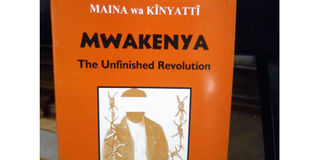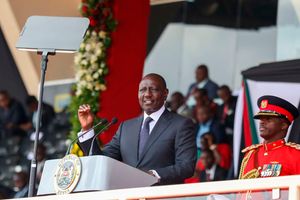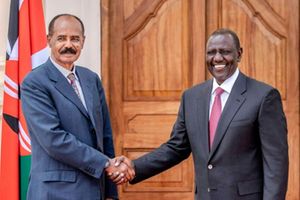
James Musyoka, who was charged with obtaining 180 copies of Mwakenya, is escorted to the court.
| File | Nation Media GroupNews
Premium
Mwakenya, the only movement the Moi regime admitted torturing
Mwakenya was the only dissident group on which the Kanu government publicly admitted having used torture to extract confessions.
“We only torture and detain members of the disruptive dissident group, Mwakenya. Otherwise, how are we going to get important information from them? These people are our enemies. They are out to destroy everything we value in our society,” a top politician is quoted to have said in July 1987.
Makwenya was an offshoot of the December Twelve Movement (DTM), which came up from the formation of a clandestine political party during the first conference of the Kenyan Marxist-Leninists secretly held as from December 22-23, 1974 in Nairobi.
One of the recommendations of the Kenyan Marxist-Leninist conference whose delegates included Adhu Awiti, Koigi wa Wamwere, Kamoji Wachiira, Maina wa Kinyatti and Amin Kassam was the formation of the Workers’ Party of Kenya.
According to the founders, the Workers’ Party of Kenya was formed to lead the struggle for democracy and social justice.
The first recruits of the clandestine party included Ngugi wa Thiong’o, Willy Mutunga, al-Amin Mazrui, Edward Oyugi, Shiraz Durrani, Ngugi wa Mirii, Sultan Somjee, Kuria Murimi, Kariuki Kiboi and Ngotho wa Kariuki.
Prof Maina wa Kinyatti, in his book Mwakenya, the Unfinished Revolution, notes the party leadership embraced the name December Twelve Movement to be a front name of the Workers’ Party of Kenya as they felt that the time was not yet ripe to publicly expose the real name of the clandestine party to the Moi security agents.
“However, that decision turned out to be a political error, for the name DTM became popular among university students, workers and the patriotic petty-bourgeoisie, and they identified with it…” Prof Kinyatti writes.
Forced exile
The growth of the underground movement shook the Moi government, resulting in the arrest of several of its leaders and forced exile for others.
The first individuals to be arrested and detained included six university academics – Prof Kinyatti, Mr Wachiira, Mr Mazrui, Dr Mutunga, Prof Oyugi and Mukaru Ng’ang’a. They were arrested and detained in June 1982 on accusations of teaching revolutionary violence and imprisoned.
Except for Prof Kinyatti, the other five were key leaders of the December Twelve Movement, which morphed into the Mwakenya movement.
The Moi regime also arrested Mumbi wa Maina, a Kenyatta University academic, while others like Ngugi wa Mirii, Kimani Gicau, Mr Durrani, Shadrack Gutto, Kuria Murimi and Prof Micere Mugo were forced into exile.
Ngugi wa Thiong’o escaped arrest because he was out of the country while Salim Lone, the editor of Viva magazine, was stripped of his citizenship and expelled from Kenya – his country of birth.
Wang’ondu wa Kariuki, another journalist, was arrested, charged with sedition and imprisoned.

Maina Kinyatti being led to cells.
The government also arrested several radical university students among them Mwangi wa Kwirikia, Onyango Oloo, Peter Ogego and Mwandawiro Mghangha. The latter was imprisoned in 1986 for being a member of Mwakenya.
In October 1984, the name of the movement was changed to the Communist Party of Kenya (CPK) from the December Twelve Movement, a name that a majority of the clandestine party leaders agreed was “abstract”.
A year later, in February 1985, the name of the movement was once again changed from the Communist Party of Kenya to Mwakenya, a Kiswahili acronym for Muungano wa Wazalendo wa Kuikomboa Kenya.
The name Mwakenya angered the government and led to increased state terrorism as from 1986 during which anyone identified as a member of Mwakenya was arrested, tortured and imprisoned.
Mwakenya also had United Movement for Democracy in Kenya (Ukenya), an outfit based in London. The leadership of Ukenya was made up of Wanjiru Kihoro, Naila Durrani, Nish Matenjwa, Wangui wa Goro, Abdilatif Abdalla, Mr Durrani, Yusuf Hassan and Ngugi wa Thiong’o.
“The December Twelve Movement stage was the first underground movement to set out a socialist agenda to oppose capitalism that Kenyatta and Moi, with the support of the UK and the USA, forced on the people via Kanu, which purged, exiled or assassinated all those in favour of socialism,” Mr Durrani says.

A book on Mwakenya written by Prof Maina wa Kinyatti. The name Mwakenya irked the government resulting to increased State terrorism from 1986.
The December Twelve Movement set out its ideology in the pioneering book, Independent Kenya, which posed a major challenge to the US-inspired, capitalist-leaning Sessional Paper No. 10 on African Socialism that was promoted by Kanu.
Similarly, Ukenya continued organizing and setting up its ideological stand. Its primary documents were The Struggle for Democracy in Kenya and Moi's Reign of Terror.
Mwakenya continued this organisational and ideological trend with publications in Kiswahili and English with key documents, including Msimamo, Democracy Plank, and its all- important Draft Minimum Programme of Mwakenya.





